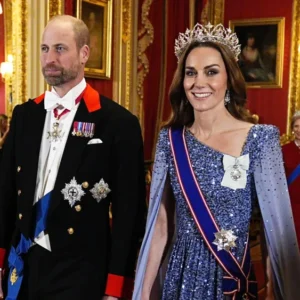Lompoc, California – In the sun-baked expanse of Vandenberg Village, where the Pacific’s roar mingles with the distant hum of Space Force launches, a nine-year-old girl’s absence has carved a void that no amount of frantic searches or flickering candlelight vigils can fill. Melodee Buzzard, with her wide brown eyes, freckled cheeks, and a laugh that once lit up family gatherings like summer fireflies, has been missing for over three weeks. What began as a seemingly innocuous mother-daughter road trip across 1,500 miles of heartland highways has spiraled into a national plea for answers, with the FBI now scouring dusty backroads from California to Nebraska. At the epicenter of this heartbreak stands Ashlee Buzzard, Melodee’s 32-year-old mother, whose silence in the face of mounting questions has only deepened the shadows of suspicion. Yet beneath the headlines of disguises and uncooperative interrogations lies a family’s long-simmering tragedy: a mother’s unraveling mental health, triggered by a catastrophic loss nearly a decade ago, that left a home in decay and a child adrift in isolation.
The alarm bells first sounded on October 14, 2025, when a diligent school liaison from the Lompoc Unified School District flagged Melodee’s prolonged absence from her independent studies program. The nine-year-old, homeschooled since kindergarten to accommodate what her mother described as “sensory sensitivities,” hadn’t logged in for assignments in over a year—a red flag in a system designed to safeguard vulnerable learners. Deputies from the Santa Barbara County Sheriff’s Office descended on the family’s modest rental in the 500 block of Mars Avenue, a quiet cul-de-sac of military families and wild mustard blooms. Ashlee Buzzard answered the door, her expression a mask of vague assurances: Melodee was “fine,” just “visiting relatives out of state.” No details, no proof of life. As officers pressed, the story frayed—Ashlee claimed a spontaneous road trip to Nebraska for a “family reunion,” but offered no itinerary, no contacts, no forwarding address. By evening, Melodee was officially listed as missing and at-risk, her cherubic face splashed across Amber Alerts from the Pacific Coast to the Cornhusker prairies.
Surveillance footage, released by investigators on October 24, has since painted a more ominous picture. Grainy frames from a Lompoc car rental agency capture the duo on October 7, the eve of their departure. There stands Melodee, dwarfed by the counter’s height, her natural curly auburn locks obscured by a straight, dark wig that cascades unnaturally over her shoulders. A hooded gray sweatshirt is pulled low, shadowing her features in a way that chills the spine. Ashlee, beside her, hovers protectively, her own affinity for wigs noted by family as a quirky hallmark turned potential tool for evasion. “It looked just like her, but… altered,” Melodee’s paternal aunt, Lizabeth Meza, whispered in a tearful interview, her voice cracking over the phone from her home in nearby Santa Maria. “Why would you disguise a child unless you’re hiding something?” The rental, a nondescript sedan, ferried them eastward through Nevada’s neon glow and Utah’s red rock canyons, veering inexplicably through Kansas on the return leg—a detour that defies the straight-shot logic of interstates and has detectives poring over toll cams and gas station receipts.
Ashlee rolled back into Vandenberg Village alone on October 10, the sedan empty save for fast-food wrappers and a faint scent of pine air freshener. Neighbors, roused by the midnight crunch of gravel, recall her silhouette unloading bags under the sodium glow of a streetlamp, no sign of the girl who once chased stray cats down the block. When pressed days later, Ashlee’s responses grew evasive: “She’s safe,” she’d murmur, eyes darting to the horizon. “I can’t say more.” Refusal to surrender her phone, to map the route, to name a single stop—it’s this stonewalling that has escalated the probe from local missing-persons unit to a multi-agency task force, with FBI behavioral analysts now dissecting her reticence for signs of coercion or concealment. “We’re not dealing with a runaway,” Sheriff’s spokesperson Raquel Zick told reporters at a tense October 25 briefing, her tone laced with urgency. “This is a child in potential peril, and every hour of non-cooperation costs us ground.”
To understand the fracture lines in this family portrait, one must rewind to 2016—a year that shattered Ashlee Buzzard’s world like plate glass under a hammer. Melodee was just six months old, a bundle of milky breaths and tiny fists, when her father, Rubiell Meza, was killed in a motorcycle crash on a rain-slicked stretch of Highway 101. The 28-year-old Air Force veteran, stationed at Vandenberg and known for his easy grin and penchant for backyard barbecues, had been en route to a surprise visit with his newborn daughter. Witnesses described the collision in heartbreaking detail: a semi-truck hydroplaning into his lane, metal twisting like taffy, sirens wailing into the fog-shrouded dawn. Rubiell’s death wasn’t just a loss; it was an erasure, leaving Ashlee—a young mother still navigating postpartum haze—with the weight of single parenthood in a military town where support networks fray like old parachutes.
The grief consumed her. What began as sleepless nights and tear-streaked pillows escalated into a mental health freefall that relatives now describe as “a dive into darkness.” Ashlee, once vibrant and quick with a joke, withdrew into paranoia and disorientation. Hospital records, pieced together from family accounts, reveal multiple involuntary commitments under California’s 5150 holds—72-hour psychiatric evaluations triggered by erratic behavior and suicidal ideation. “She wasn’t eating, wasn’t sleeping, talking to shadows that weren’t there,” recalls Lori Miranda, Ashlee’s own mother and Melodee’s maternal grandmother, her voice a gravelly whisper in a KSBY News exclusive aired October 21. Miranda, a retired nurse from Orcutt with silver-streaked hair and hands callused from years of caregiving, has become the reluctant voice of this unraveling legacy. “It started right after Rubiell died. The light went out in her eyes, and it never came back the same.”
The nadir came in those early months of widowhood, when Melodee was still in diapers. One autumn evening in 2016, deputies responded to a welfare check at Ashlee’s cramped apartment in Orcutt, a suburb 20 miles south of Lompoc. Neighbors had complained of “strange noises”—muffled sobs, pacing footsteps, the clatter of unwashed dishes piling like accusations. When officers breached the door, they found squalor: floors sticky with spilled formula, laundry heaped in corners like defeated soldiers, and in the kitchen, a tableau of neglect that seared into Miranda’s memory. “I got the call from the sheriff about 15 minutes before I was supposed to drop by,” she recounted, eyes distant as if reliving the drive. “He said, ‘We’re taking your granddaughter to CPS, and your daughter to the hospital.’ I couldn’t believe it was her house. Raw eggs congealed in pans on the stove, rotten food festering in the fridge—she was trying to feed it to my baby girl, like it was normal.”
Miranda arrived to a scene of controlled chaos: social workers bundling a wailing Melodee into a carrier, Ashlee catatonic on the couch, murmuring about “protecting her from the ghosts.” The intervention was swift—Ashlee committed for evaluation, Melodee placed temporarily with relatives. Custody hearings followed, a bureaucratic gauntlet that pitted Ashlee’s desperation against the paternal family’s pleas. Rubiell’s mother, Lilly Denes, and sister Lizabeth Meza launched a fierce bid for guardianship, citing Ashlee’s instability and the child’s right to a stable home. “We fought tooth and nail,” Meza said in a heartfelt Facebook post that went viral amid the search, amassing thousands of shares. “Rubiell would have wanted her safe, surrounded by love—not hidden away.” Documents from the Santa Barbara County Family Court reveal a pattern: Ashlee’s initial loss of custody in late 2016, a brief foster stint for Melodee, and a hard-won regain in 2017 after mandated therapy and medication compliance. Yet the victory felt pyrrhic; Ashlee, buoyed by outpatient support, retreated further, severing ties with extended kin under the guise of “boundaries.”
For four years, Melodee became a ghost in her own lineage. Birthdays passed unmarked, holidays hollow. Denes, a soft-spoken widow who tended a victory garden in her Lompoc backyard, stockpiled gifts in a cedar chest: a stuffed unicorn for her seventh birthday, watercolor sets for her artistic streak, a locket engraved with “Nana’s Brave Girl.” “My psychologist told me to keep them,” Denes shared ahead of a community vigil on October 25, her voice trembling with resolve. “So she’d know we never stopped waiting.” Meza, a paralegal with a tattoo of Rubiell’s initials on her wrist, echoed the sentiment: “Ashlee called her ‘extremely mentally unstable’ in whispers, but we said it louder in court. She isolated that child like a secret, no playdates, no cousins’ barbecues. How does a little girl thrive in that?”
The isolation bred concerns that now haunt the investigation. Melodee, described by rare family photos as a sprite with her father’s dimples and her mother’s curls, excelled in quiet pursuits: sketching fantastical beasts in spiral notebooks, devouring chapter books about orphaned adventurers, whispering secrets to her goldfish, Bubbles. But homeschooling, intended as a haven, morphed into seclusion. School records show sporadic check-ins, with Ashlee citing “health issues” for absences. Relatives whisper of unchecked episodes—Ashlee’s “bad days” where paranoia spiked, doors bolted against imagined threats. Miranda, torn between maternal loyalty and grandmotherly fury, pleads for compassion amid the clamor. “Everybody’s dragging her around like a suspect, rattling her cage,” she told reporters, advocating for hospital-based questioning over station-house grillings. “Treat the illness, not just the crime. That’s what Rubiell would want—for both of them.”
As the search widens, the heartland becomes a canvas of clues. Detectives canvas Nebraska’s Platte River motels and Kansas truck stops, chasing whispers of a woman and child in a rental sedan. Digital forensics sift Ashlee’s sparse social media—a dormant Facebook profile frozen in 2020, peppered with Rubiell’s memorials and cryptic quotes about “guardian angels.” The FBI’s Child Abduction Rapid Deployment team, activated October 22, deploys profilers to map Ashlee’s psyche: Is this flight a symptom of delusion, a bid for reinvention, or something more sinister? Public tips flood hotlines—(805) 681-4150 for sightings, (805) 681-4171 for anonymity—yielding false positives: a wigged girl at a Topeka diner, a hoodie-clad figure in Omaha’s Old Market. Each dead end tightens the knot of dread.
Vigils dot the landscape like defiant beacons. On October 25, over 200 gathered at Mars Avenue’s edge, candles flickering against the dusk as Denes led prayers: “Return our Melodee, whole and hopeful.” Meza unfurled a banner—”Find Melodee: She’s Out There”—while Miranda, absent but represented by a proxy, urged Ashlee through the crowd: “Come home, baby. Let us help.” The event, amplified by true-crime podcasters and X hashtags surging past a million impressions, has mobilized drone searches over rural Kansas and billboards along I-80. Child welfare advocates seize the moment, decrying gaps in homeschool oversight—California’s lax reporting requirements that allowed Melodee’s year-long fade from view. “This isn’t just one family’s storm,” notes a Santa Barbara-based counselor specializing in grief. “It’s a systemic squall: untreated trauma rippling through generations, leaving kids like Melodee unmoored.”
In the quiet hours, as coyotes yip under Vandenberg stars, the Buzzard-Meza clan clings to slivers of hope. Denes fingers that locket, whispering Rubiell’s name like an incantation. Meza scrolls missing-persons forums, her legal mind dissecting timelines. Miranda, back in Orcutt, battles her own ghosts—regret for not fighting harder post-2016, fear that history’s rot has claimed another innocent. For Melodee, wherever she wanders—be it a Nebraska farmhouse or a Kansas field—the message echoes unbroken: “Tell someone, ‘I’m Melodee Buzzard. My grandma Luna’s looking for me. Call the police.'” In a tale woven from widow’s weeds and whispered warnings, it’s a child’s voice that must pierce the silence, pulling light from the long shadow of loss.





